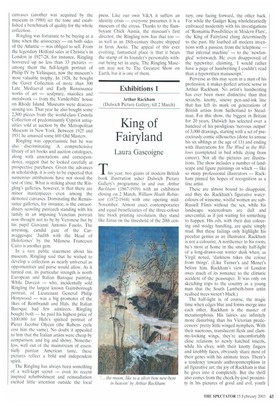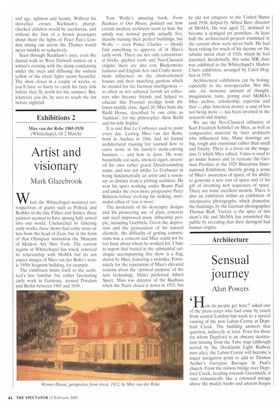Arthur Rackham (Dulwich Picture Gallery, till 2 March)
King of Fairyland
Laura Gascoigne
This year, two giants of modern British book illustration usher Dulwich Picture Gallery's programme in and out: Arthur Rackham (1867-1939) with an exhibition closing on 2 March, William Heath Robinson (1872-1944) with one opening midNovember. Almost exact contemporaries and equal beneficiaries of the three-colour line block printing revolution, they stand like Janus on the threshold of the 20th cen
tury, one facing forward, the other back. For while the Gadget King wholeheartedly embraced modernity with his investigations of 'Romantic Possibilities in Modern Flats', the King of Fairyland clung determinedly to the past. He loathed all modern inventions with a passion, from the telephone — 'that infernal machine' — to the 'newfangled' wristwatch. He even disapproved of the typewriter. claiming, 'I would rather have a page of handwriting I couldn't read than a typewritten manuscript.'
Perverse as this may seem in a man of his profession, it makes perfect artistic sense in Arthur Rackham. No artist's handwriting has ever been more distinctive than that scratchy, knotty, sinewy pen-and-ink line that has left its mark on generations of British artists from Sutherland to Steadman. For this show, the biggest in Britain for 20 years, Dulwich has selected over a hundred of his prodigious 'nervous output' of 3.000 drawings, starting with a set of precociously comic silhouettes (done to amuse his six siblings at the age of 13) and ending with illustrations for The Wind in the Willows (completed in bed while dying from cancer). Not all the pictures are illustrations. The show includes a number of landscape and figure paintings on which — like so many professional illustrators — Rackham pinned his hopes of recognition as a fine artist.
These are almost bound to disappoint. and they do. Rackham's figurative watercolours of winsome, wistful women are subRussell Flints without the sex, while his landscape watercolours are dull and uneventful, as if just waiting for something to happen. His oils, with their dun colouring and stodgy handling, are quite simply mud. But these failings only highlight his peculiar genius as an illustrator. Rackham is not a colourist. A northerner to his roots, he's most at home in the smoky half-light of a long-drawn-out winter dusk when, as Virgil noted, 'darkness takes the colour from things'. (Like Turner's and Monet's before him. Rackham's view of London owes much of its romance to the climatic accident of the peasouper. It was only on sketching trips to the country as a young man that the South Lambeth-born artist realised trees weren't black.) The half-light is, of course, the magic time when edges blur and forms merge into each other. Rackham is the master of metamorphosis. His fairies are infinitely more disturbing than his Victorian predecessors' pretty little winged nymphets. With their nacreous, translucent flesh and clammy-looking wings, they're uncomfortably close relations to newly hatched insects, while his elves, with their knotty fingers and knobbly faces, obviously share most of their genes with his animate trees. There's a tendency towards anthropomorphism in all figurative art; the joy of Rackham is that he gives into it completely. But the thrill also comes from the cheek-by-jowl proximity in his pictures of good and evil, youth and age, ugliness and beauty. Without his shrivelled crones Rackham's plumpcheeked children would be saccharine, and without the hint of a brown peasouper about them the lights of Peter Pan's London strung out across the Thames would never twinkle so seductively.
Seen through Rackham's eyes, even the dismal walk to West Dulwich station on a winter's evening with the damp condensing under the trees and diffusing the sodium yellow of the street lights seems beautiful. The show closes in a couple of weeks, so you'll have to hurry to catch his fairy folk before they fly north for the summer. But, whatever you do, be sure to reach the inn before nightfall.



































































 Previous page
Previous page